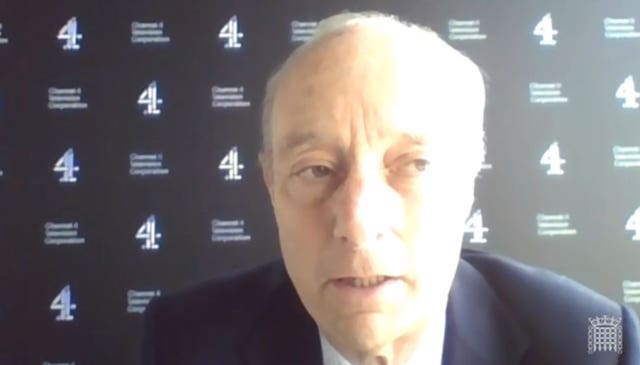
Likely investors in a privatised Channel 4 would include “big American conglomerates”, the chairman of the broadcaster has said.
Charles Gurassa was asked to address the possible impact privatisation would have on Channel 4 during an appearance before MPs at the Digital, Culture, Media and Sport Committee.
He said potential buyers for the channel would include large companies in the US.

Mr Gurassa told the committee: “You would have to say that potential investors include big American players who would look at it as a way of pushing content through more channels more securely.
“If an investment banker was drawing up a list of potential investors, you would find all the big American conglomerates on there.”
Mr Gurassa was also asked by committee chairman Julian Knight if he felt Channel 4 was in “the firing line of the culture wars” as a result of press briefings from Number 10 that the channel was “woke and struggling”.
Mr Gurassa refuted the suggestion, saying the broadcaster was in “rude health”.
He added: “As for woke, we are there to be an independent voice, we are regulated by Ofcom, we are committed to impartiality and to ensuring all voices are heard from across the spectrum and I am confident and comfortable we are fulfilling that role to the best of our abilities.”

Channel 4’s chief executive Alex Mahon, who also appeared before the committee, was asked if it would be harder for the broadcaster to deliver its mandate if it were privatised.
Ms Mahon said Channel 4 has come through the pandemic “in a robust way, in sound financial health”.
She added: “It shows us we are doing something the British public want and they appreciate and they need.
“That contribution is economic, cultural and also social and if we were to look at any other structure what we would need to think about was what was being gained or being lost by the British public and if there was a change of ownership, is that worsening the media landscape for them or making it better?”
Ms Mahon said it was important to stress “Channel 4 is not just surviving is it, it’s thriving”.
She added: “It’s never been the biggest channel, when it was set up by the Thatcher government in, what 1982… it’s never been about being the biggest or the largest, and it’s never been about driving profit.
“It has been very much about driving benefits to the public and it hasn’t been about a single bottom line, it has been about growth across the creative industries in multiple bottom lines in many small and medium businesses.”
She went on to say that the broadcaster was popular among young audiences, adding: “Young people are very elusive for other broadcasters – they are not for us, we’ve grown our impact with young people.”


Comments: Our rules
We want our comments to be a lively and valuable part of our community - a place where readers can debate and engage with the most important local issues. The ability to comment on our stories is a privilege, not a right, however, and that privilege may be withdrawn if it is abused or misused.
Please report any comments that break our rules.
Read the rules here